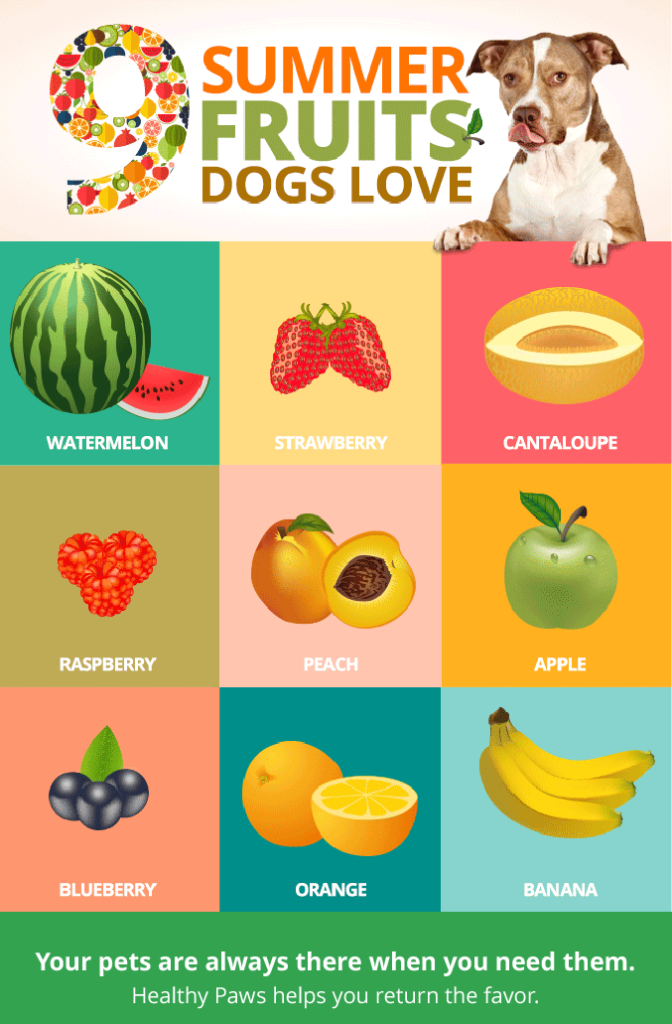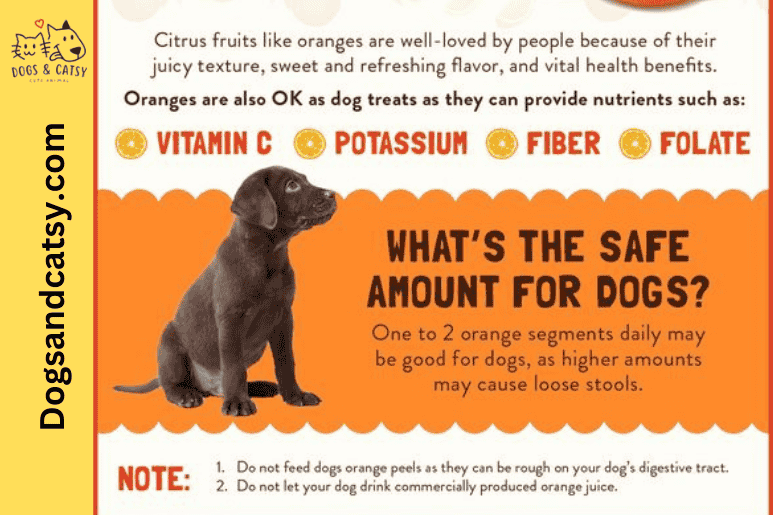Can Dogs Eat Oranges (Benefits, Harms and Precautions)

Dogs can eat oranges in moderation, but they aren’t necessary for their diet. Oranges offer vitamin C, potassium, and fiber, which can benefit a dog’s immune system and digestion. However, their acidic nature and sugar content mean they should be a rare treat, not a regular part of a dog’s diet. Always remove the peel and seeds first, as these can be harmful to your pet.
Can Dogs Eat Oranges?
Oranges can be a beneficial treat for dogs if offered in small amounts. Consulting your veterinarian before introducing new foods to your pet’s diet is essential to avoid any gastrointestinal issues.
These fruits are rich in vitamin C, fiber, and potassium, which support overall health but should be given sparingly due to their sugar and acid content. Additionally, securing a comprehensive pet insurance policy can provide a financial safety net for unexpected health issues.
How Many Oranges Can a Dog Eat?
Oranges and similar fruits should be treated as occasional snacks rather than essential components of your dog’s diet. Here’s a concise guideline on how to safely treat your dog with oranges:
- Limit the portion to one to three slices of orange to ensure it doesn’t exceed 10% of their total diet.
- Exceeding this guideline can cause gastrointestinal disturbances.
If your dog shows signs of vomiting, diarrhea, or abdominal pain after eating oranges, contact your veterinarian immediately.
Also Read: Vet’s Take: Blueberries for Dogs—Yay or Nay?
Are Oranges Good for Dogs?
Oranges are not only tasty but also packed with nutrients beneficial for your dog’s health. Below is a summary of the key nutrients found in the fleshy parts of oranges:
- Potassium: Vital for proper kidney, heart, muscle, and digestive functions.
- Fiber: Aids in maintaining gut health, regulates bowel movements, supports colon health, and helps reduce inflammation.
- Vitamin C: Although dogs naturally produce vitamin C, additional sources from foods can enhance their immune system due to its antioxidant properties.
These nutrients are advantageous to your dog’s health when given in appropriate amounts.

How To Safely Feed Oranges To Dogs?
To safely introduce oranges into your dog’s diet, consider these straightforward steps:
- Remove the peel and seeds: Before offering an orange to your dog, ensure it is fully peeled and all seeds are removed to prevent any risk of choking or digestive distress.
- Limit the serving size: Oranges should be given in moderation. A few slices, ensuring they make up no more than 10% of your dog’s daily caloric intake, will avoid any gastrointestinal issues.
- Introduce gradually: Start with small amounts to see how your dog reacts to oranges. This cautious approach helps prevent any adverse reactions and lets you monitor their tolerance to this new treat.
Health Benefits of Oranges for Dogs
Feeding your dog oranges can bring several health advantages due to their nutrient-rich composition. Here’s a simplified breakdown of the benefits:
- Vitamin C: Oranges are excellent for boosting the immune system. Including a slice or two in your dog’s diet occasionally might enhance its immune health.
- Fiber: This nutrient in oranges aids digestion and can help manage both constipation and diarrhea in your dog.
- Hydration: With oranges being nearly 90% water, they serve as a hydrating treat, especially beneficial on warm days or for dogs on a weight management plan.
- Calcium and Potassium: These crucial electrolytes support your dog’s metabolism and dental and bone health, and ensure proper function of organs and nerves.
These nutrients collectively contribute to maintaining and promoting your dog’s overall health.
Hazards of Oranges for Dogs
Oranges, while not inherently toxic to dogs, come with certain risks that need careful consideration before feeding them to your pet. The primary concern with oranges is their sugar content, which can lead to gastrointestinal upset in some dogs.
Potential hazards include:
- Digestive issues: Overconsumption can cause diarrhea or constipation.
- Choking hazard: Unpeeled oranges or those with seeds can pose a choking risk.
- Weight gain: Due to their sugar content, excessive feeding of oranges can contribute to obesity.
In moderation, oranges can be a healthy treat, but it’s essential to introduce them gradually and observe your dog’s reaction. Always ensure to remove the peel and seeds to minimize any health risks, maintaining the overall well-being of your furry friend.
Also Read: Is It Safe for Dogs to Eat Eggshells? Vet’s Insight!
Other Fruits Dogs Can Eat
Like oranges, a range of fruits are safe and beneficial as treats for dogs, providing essential nutrients and hydration. These fruits should be served in moderation and prepared properly to ensure they are safe for canine consumption.
Here’s a brief overview of other fruits dogs can safely enjoy and their key health benefits:
| Fruit | Health Benefits for Dogs |
|---|---|
| Apples | Low in fat and contain fiber, vitamins A and C |
| Bananas | High in potassium, vitamins, biotin, and fiber |
| Blueberries | Packed with antioxidants and fiber |
| Cantaloupe | Good source of hydration and vitamins A and C |
| Cranberries | Can help with urinary tract health |
| Cucumbers | Low calorie, hydrating, and contain vitamins K, C, and B1 |
| Mangos | Rich in vitamins A, B6, C, and E, along with potassium |
| Peaches | Source of fiber and vitamin A |
| Pears | High in fiber and vitamin C |
| Pineapple | Contains bromelain, which helps with protein digestion |
| Pumpkin | Great for digestion due to high fiber content |
| Raspberries | Low in sugar, high in fiber, vitamins C, manganese |
| Strawberries | High in fiber and vitamin C; can help whiten teeth |
| Watermelon | Mostly water, providing hydration along with vitamins A and C |
Incorporating these fruits into your dog’s diet can offer a tasty, nutritious treat while complementing their regular meals. Always ensure to remove any seeds or pits and introduce each new fruit gradually to monitor your dog’s response.

Frequently Asked Questions (FAQs)
Can Dogs Eat Orange Peels?
No, dogs should only consume the fleshy part of oranges as the seeds and peels may contain harmful toxic compounds. Orange peels are particularly challenging for a dog’s digestive system and could lead to blockages requiring surgical intervention.
To ensure your dog’s safety, it is crucial to remove the peel, seeds, and white film from the orange before feeding it to your pet. This precaution helps avoid any potential health risks associated with these parts of the fruit.
Can Dogs Eat Mandarin Oranges?
Yes, dogs can enjoy mandarin oranges in moderation due to their high sugar content. It’s crucial to limit their consumption, especially for diabetic dogs, to prevent health issues related to excessive sugar intake.
Ensure that all peels are removed and inaccessible to your dog, and only offer a few segments occasionally as a treat. This careful approach helps maintain your dog’s health while allowing them to enjoy this sweet fruit.
Also Read: Do Vets Approve Tomatoes for Dogs? Get Answers!
Can Dogs Eat Clementine Oranges?
Yes, dogs can safely consume clementines in small amounts. Offer only a segment or two to avoid gastrointestinal issues, as dogs may struggle with excessive citrus. It’s important to remove the peel before feeding, as dogs have difficulty digesting it effectively.

Can Dogs Eat Orange Slices?
Yes, dogs can have orange slices in moderation. Limit the amount to one to three slices per day, as excessive citrus and sugar can negatively impact your dog’s health. It’s important to avoid feeding them the entire fruit to ensure their diet remains balanced and healthy.
Can Dogs Have Orange Juice?
Yes, but only in small quantities. According to Michael, fresh squeezed orange juice can be offered to dogs but should be limited to small quantities. It’s advisable to give no more than a few tablespoons, ideally mixed into their regular food. This is particularly important to avoid the high sugar content found in commercially prepared orange juices.
Can Dogs Eat Satsumas
Yes, dogs can eat satsumas in moderation. Satsumas are a type of seedless mandarin orange that can be a sweet treat for your dog, but it’s important to manage the quantity because of their sugar content. Always remove the peel before offering satsumas to your dog, and limit the portion to just a segment or two to avoid any potential digestive upset.
Why does my dog love oranges?
Oranges, rich in vitamin C, fiber, and potassium, can offer nutritional benefits to your dog, such as boosting the immune system and increasing energy levels. Many dogs enjoy the sweet and refreshing taste of oranges, making them a favored treat. However, it’s important to remember that not all dogs may like the flavor of oranges.






